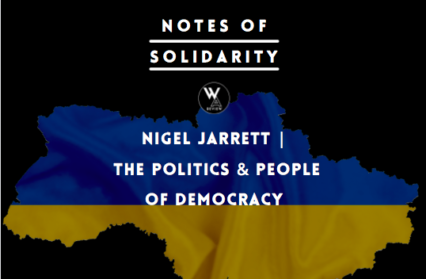Notes of Solidarity is a new daily series of mini-essays, poems, and reflections on the Russian war on Ukraine by some of Wales’s leading literary figures. Here, writer and critic Nigel Jarrett offers his thoughts on the histories and complexities of conflict and democracy.
First, a blizzard of unpalatable facts, then the clear-ish light…
Like other international conflicts, the invasion of Ukraine has two main components – the politicians and the people – and each is split into a myriad of other elements. Neither the Russian people nor the Ukrainian people want war. Successful Nazi propaganda in the second world war might convince us that all the German people supported Hitler and all Austrians supported Anschluss. Not so. The political sub-elements in that conflagration are well-rehearsed; they include the feeling that Germany fared badly at the Treaty of Versailles after the Great War. Attendant but unrelated sub-divisions at the political level also included the ‘requirement’ of lebensraum and the idea of Aryan supremacy.
Beside those of the Russia-Ukraine conflict, history and hindsight enable the factors of eighty years ago to be tidily enumerated.
Independent, post-Soviet Ukraine is not a liberal democracy. It banned Russian as a language in the secessionist east of the country just as the UK government here might ban Welsh in Wales. In December 2021, Dmytro Kotsyubaylo of the ultra-nationalist Right Sector volunteer battalion became the first living Hero of Ukraine, a title conferred by President Zelensky, a hero of his own current hour. In 2014, an elected Ukraine government was overthrown by pro-EU/NATO forces and nationalists began de-Russianising a traditionally Russia-friendly country. Right wing fanatics chased anti-coup protesters into a trade union building in Odessa and burned it down with appalling loss of life. These forces banned the Communist Party, then the second most popular in the country.
The Crimea population identifies as Russian and speaks Russian; it had only been assigned administratively by the Soviets to Ukraine, a Soviet republic, in the 1950s. About 97% of Crimea voted to re-join the Russian Federation (albeit in a referendum recognised as invalid by the United Nations and steeped in accusations of corruption and unfairness). And so on.
But above and beyond all this and inviolable are the much-scorned concepts of freedom of speech, of information and of assembly. They constitute democracy, also much-maligned and ridiculed because it sometimes leads to the deprivation and political horror it seeks to avoid. But, without it and whether we avail ourselves of it or not, we shall grope in the dark.
For more information on the Russia-Ukraine war, including ways you can help, please click here.
You can follow all contributions to Notes of Solidarity from Wales Arts Review here.
Nigel Jarrett is a former daily-newspaperman, the winner of the Rhys Davies Prize for short fiction, a regular contributor to Wales Arts Review, and the author of five books, including the widely-praised story collection, Funderland.



 Enjoyed this article? Support our writers directly by buying them a coffee and clicking this link.
Enjoyed this article? Support our writers directly by buying them a coffee and clicking this link.







